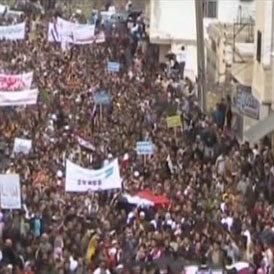Hague pushes for sanctions as Syria violence intensifies
Foreign Secretary ‘utterly condemns’ the killing of civilians but says a UN resolution condemning Syria’s crackdown will be difficult to obtain.
Syrian security forces – backed by snipers, tanks and heavy armour – have arrested at least 500 pro-democracy activists as the government continues its violent crackdown on protests across the country.
Sawasiah – a Syrian human rights group – said it has received reports that at least 35 civilians have been killed in Deraa near the Jordanian border since the army entered in the early hours of Monday morning.
But Sawasiah say reports in Deraa are difficult to verify as land lines, mobile phone networks, and the internet, have been blocked across large parts of the city.
Sawasiah also said two people had died in the Damascus suburb of Douma, adding to over 80 deaths on Friday and bringing the death toll to over 400 since the protests intensified last month.
Separately, the Syrian Observatory for Human Rights said security police arrested prominent rights campaigner Qassem al-Ghazzawi in his home city of Deir al-Zor in Syria’s impoverished east.

The Foreign Secretary called for President Assad to stop “the violent repression” and said Britain was working with EU partners to stop the killing of peaceful protesters.
“Syria can choose ever more violent repression, which can only bring short term security for the authorities there. If it does so we will work with our European partners and others to take measures, including sanctions, that will have an impact on the regime,” he told Parliament
Read more: Arab revolt – the Middle East uprisings
But he warned that obtaining a resolution from the UN will be difficult for security council members such as Russia and China – already uneasy about the Libya resolution – object.
“If they (the Syrian government) continue to go down the route of ever more violent repression, well then of course, our concerns may be shared more widely at UN Security Council and the situation there may change,” he said.
In a statement the Arab League condemned the use of force against pro-democracy protesters but did not single out any particular Arab country.
“The people’s demands for freedom and democracy are demands that require support … not bullets in the chests of demonstrators,” the 22 member body said.
“We call on Arab regimes and governments to commit to and speed up reforms, immediately stop using force against demonstrators and spare their citizens bloodshed,” it added.
The Arab league said it would ask foreign ministers to discuss this “serious situation” during a meeting scheduled for next month.
Sanctions are also being considered by the US who said it “deplored the brutal violence.”
The US State Department also said it has ordered some non-essential embassy officials in Damascus and all embassy dependents to leave Syria because of the “uncertainty and volatility” in the country.
Read more: Syria deploys troops and tanks in brutal crackdown
In Turkey, Syrian opposition figures pleaded for international help.
“Our friends in the West, in Turkey, in the Arab world, if they want to help us, then they can do that by… putting the clearest possible pressure on the Syrian regime to stop targeting civilians,” Anas Abdah, the British-based chairman of the Movement for Justice and Development, told Reuters.
Abdah also said he had reports that some officers were defying orders and trying to stop Assad loyalists from entering Deraa.
Syria could ‘live with sanctions’
As the international community unites to condemn the violence in Syria, one expert has told Channel 4 News the situation will get worse before it gets better.
Dr Frederic Volpi, a senior lecturer in International Relations at the University of St Andrews, said: “The situation is quickly deteriorating.
“There is the same kind of potential in Syria as there was in Libya for all out domestic confrontation.”
Dr Volpi said military intervention by the West was not an option because of commitments in Libya and that diplomatic efforts would have to be intensified.
“The Syrian regime has been trying to reposition itself as a major player in the region.
“Political sanctions and international disapproval will be a setback for the Syrian regime but they can live with it. They have done so in the past and will do again.”
-
Latest news
-
500 years of music: exhibition challenges when Black British music began5m

-
‘We’ve got to do more’, says World Food Programme’s Palestine Director3m

-
Palestinian president expects Israel will go into Rafah ‘in coming days’1m

-
Rishi Sunak refuses to rule out July general election, again3m

-
Local elections: every Dorset council seat is up for grabs6m

-




